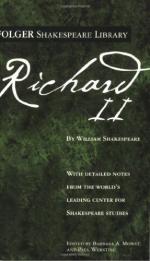|
This section contains 743 words (approx. 2 pages at 400 words per page) |

|
King Richard II Summary & Study Guide Description
King Richard II Summary & Study Guide includes comprehensive information and analysis to help you understand the book. This study guide contains the following sections:
This detailed literature summary also contains Further Study and a Free Quiz on King Richard II by William Shakespeare.
It is generally believed that Shakespeare wrote during the mid-1590s Many scholars maintain that the play could not have been written before late 1594 or early 1595, Since It was not until this time that a poem thought to be one of Shakespeare's primary sources was listed in the Stationers' Register. (The Stationers' Company was an association of manufacturers and sellers of books. They kept a register of the tides of works to be printed and published.) The poem was an epic Written by Samuel Daniel entitled The Civil Wars Richard II Itself was not listed in the Stationers' Register until August 29, 1597.
In addition to Samuel Daniel's poem, in which there are many parallels to Richard II, Shakespearean scholars Identify several other works from which Shakespeare may have drawn in writing Richard II Viewed as the most significant of these sources is Raphael Hollnshed's Chronicles of England, Scotlande, and Irelande (1587). Holinshed offers an account of the historical Richard II's reign, deposition, and assassination. Shakespeare freely appropriated this source material in many ways, including in the area of characterization. Gaunt, for example, is depicted by Holinshed as greedy and ruthless, whereas Shakespeare portrays him as a Wise and patriotic nobleman. For the plot sequence, Shakespeare adapted Edward Hall's The victim of the two noble and IIlustre families of Lancastre and York Additionally, scholars suggest that Shakespeare's sympathetic or pitying attitude toward Richard may have been derived from several French sources
Richard II earned a reputation among Elizabethan audiences as a politically subversive play In 1601, supporters of the Earl of Essex, who would the next day (February 7) mount an unsuccessful rebellion against Queen Elizabeth, paid Shakespeare's company to put on a special performance of the play. Queen Elizabeth was compared to Richard, because of her lack of an heir and due to what some subjects viewed as her inclination toward heavy taxation and indulgence of her favorites Sixteenth-century critics often viewed the play as a politically dangerous commentary on the monarchy, and It was not until the eighteenth century that the play began to generate literary, rather than political, interest.
The main Issues in the play are all rather inter-related and focus on the nature of kingship; whether Richard is deposed by Bolingbroke or deposes himself; and the characterization of Richard and Bolingbroke The play examines the conflict between the legal and divine right to rule, and the effectiveness of the ruler. Richard is believed to be the legal, rightful ruler of England, ordained by God Yet he is also shown to be a weak and ineffective king who focuses more upon the appearances, rather than the responsibilities, of kingship, Bolingbroke acts decIsIvely, and arguably, with moral Justification. He also is backed by the support of the people It is unclear whether or not Shakespeare favored Richard and the dIvine right to rule over Bolingbroke and the effective use of political power, wielded with the consent of the people Similar debate surrounds the Issue of Richard's deposition Does Bolingbroke truly force Richard to give up the crown, and has he been plotting to do so all along? Or does Richard timidly and without much cause surrender the kingship to Bolingbroke? The questions are debated by critics who find support for both arguments within the play.
A related Issue is the characterization of both Richard and Bolingbroke Some find Richard's weakness sympathetic, others find It despicable Those who pity Richard's weakness maintain that he may be weak, but he is not evil. He is, however, influenced by evil advisors who offer bad counsel Richard's supporters also point out that he is, in fact, the rightful king Others contend that Richard's weakness and ineffectiveness are harmful to England, a fact to which Richard is oblivious Richard is often accused of being overly concerned with himself, his personal gain, and the luxuries he enjoys as king. Additional counts against Richard include his role in the death of Gloucester, the banishment of Bolingbroke, and the confiscation of Gaunt's estate. Critical estimation of Bolingbroke is likewise divided. He is viewed as a traitor and usurper by some. Others maintain that his actions are justified and in fact save England from ruin. While he Illegally returns to England after he has been banished, he has in fact been illegally disinherited by Richard. For most of the play, he is silent about his own motivations, and It is alternatively argued that he is driven by political ambition or by noble intentions.
Read more from the Study Guide
|
This section contains 743 words (approx. 2 pages at 400 words per page) |

|



